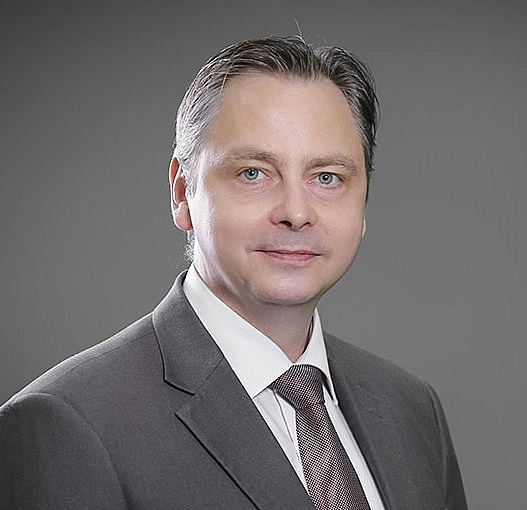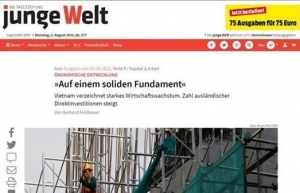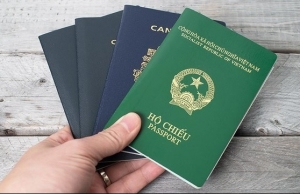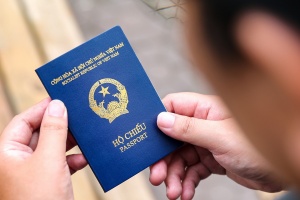An enticing arena for German groups
The first reason is the dynamic environment. Vietnam is located in a highly attractive growth region, which enables the country to act as a connecting hub in the Asia-Pacific region. The rapid growth and dynamic investment environment even took place during the difficult pandemic crisis. With continuous dynamism, Vietnam is increasingly attracting international and German companies.
 |
| Marko Walde - Chief representative Delegation of German Industry and Commerce in Vietnam |
Global integration and the China +1 policy are additional factors. Vietnam has a broad network of free trade agreements and the nation regionally offers the lowest market entry barriers for foreign companies. China +1 has become a common term among German companies that have invested in China and are currently searching for a second market for diversification. Among possible locations, Vietnam is often the most suitable destination.
In Vietnam, there is also a large talent pool and competitive labour cost. Vietnam is an emerging market with about 55 million people of working age. In addition, the country’s economic development has relied heavily on low-cost labour and the average wage is around only one-fifth of China. The large market of young, motivated, and relatively well-trained labourers remain the greatest asset of Vietnam and will continue to expand in the coming years.
Another aspect is infrastructure and sustainability. The government is developing national infrastructure and aims to increase its proportion of the renewable energies mix. The final main reason for the heavy interest is current relations with Germany. Both nations are strategic partners and have excellent economic relations. Germany enjoys a great reputation in Vietnam and is Vietnam’s largest EU trading partner. Bilateral trade in goods has also increased four-fold in the last 10 years.
Essential skills
In our AHK World Business Outlook 2022 conducted in spring, around 93 per cent of German companies said they would continue to invest in Vietnam, and almost two-thirds of them expected their business to develop better in the next 12 months. These are the results of Vietnam’s border reopening and the government’s drastic policies in boosting post-pandemic economic recovery. Implementing business activities in Vietnam, German investors evaluate the importance of the following factors: availability of skilled labour forces, the quality of the education, and logistics and infrastructure.
To engage deeper in the Vietnamese value chain, German companies must be able to find a suitable, qualified workforce that is competent in operating modern machinery and equipment. Although the workforce in Vietnam is young and abundant, most of them are lacking needed essential skills in the market.
Understanding the challenges, since 2013 we have been assisting German companies in establishing a comparable, quality-assured dual vocational education and training programme in Vietnam based on German standards, aiming to convey practical skills that fulfil the desired hiring and production requirements of companies. There are over 500 German companies acting in Vietnam, 80 of which are manufacturers, creating around 47,000 jobs here.
Additionally, Germany’s total investment has reached more than $2.3 billion dollars. The trading volume in 2021 alone reached $14.33 billion. On the other side, Vietnam is Germany’s second most important trading partner in the ASEAN region. As there is now a free trade agreement with the EU (EVFTA) in force, we expect the trade volume between the two to increase to around $20 billion in the next 2-3 years.
Sustainable prospects
The EVFTA and the Comprehensive and Progressive Agreement for Trans-Pacific Partnership are the two largest free trade agreements that Vietnam has ever negotiated. For German investors, therefore, the overall market is quite attractive in terms of manufacturing and affordable labour costs. The EVFTA has brought additional benefits regarding lower to zero tariffs and created a better investment environment.
Furthermore, it is likely to accelerate Vietnam’s institutional reforms and support the country to comply with international standards, especially in areas such as investment protection, labour standards, and intellectual property. The main advantages for German companies are better market access and legal certainty in Vietnam’s growing market.
ASEAN is a strong contender to be an alternate investment hub to China. Vietnam, due to its proximity to China, its long coastline, and low export tariffs implemented by the EVFTA, has secured its position as a promising destination outside China. An important component is the diversification of supply chains. By localising production, German investors can optimise manufacturing costs while limiting interruption or delays to current supply chains.
International and German companies are always searching for new investment locations, especially for production. Furthermore, most companies are asking for a more sustainable and green energy source. The Vietnamese government is prioritising fostering sustainable development and set a long-term objective for developing a green energy plan and energy alternatives.
For instance, the Vietnam Green Growth Strategy aims to accelerate the economic restructuring process by using natural resources effectively as well as lowering greenhouse gas emissions with new technologies. German enterprises can also take advantage of this sustainable trend since Vietnamese authorities are currently focusing heavily on creating opportunities and incentives for sustainable enterprises.
For example, PNE AG from Germany is one of the world’s top investors in developing onshore and offshore wind projects that operate in 13 countries. With an upcoming investment of up to $4.8 billion, PNE is building a mega offshore wind power project in the south-central province of Binh Dinh, which is turning Vietnam into a competitive wind power supplier in the region. PNE’s plan is to build as many as 160 wind turbines with a total capacity of up to 2,000MW. The project is highly feasible, providing a considerable amount of electricity to Binh Dinh and the national power system, totalling around 6.6-7 billion kWh a year.
Sustainability is a wide field, ranging from protection of the environment to the observance of human rights. The new Law on Due Diligence in Supply Chains aims to ensure that large German companies take care of their suppliers’ compliance with certain social and environmental standards from 2023 onwards by anchoring corresponding obligations in their supplier contracts.
Hence, German companies operating in Vietnam also need to meet and demonstrate compliance with high human rights and also environmental standards in their own business operations.
 | Vietnam develops world’s first effective vaccine against ASF: German newspaper Vietnam has developed the world's first commercial safe and effective vaccine against African swine fever (ASF), German newspaper Agrarheute (Agriculture Today) reported on July 1. |
 | Vietnam grows on strong footing: German newspaper Vietnam has seen strong growth in two years of COVID-19 and an increase in foreign direct investment (FDI), according to an article on the Southeast Asian nation’s development freshly published on Germany’s Junge Welt newspaper. |
 | Germany stops issuing visas for Vietnam’s new passport The status of the new Vietnamese passport has been thrown up in the air after Germany declared that it would not issue visas, citing insufficient details regarding the holder’s place of birth. |
 | Vietnamese using new passport form can travel to Germany Germany now temporarily recognises the new model Vietnamese passport that provides information about the place of birth. Visa issuances will resume, with the exception of multi-year type C visas. |
What the stars mean:
★ Poor ★ ★ Promising ★★★ Good ★★★★ Very good ★★★★★ Exceptional
Related Contents
Latest News
More News
- SK Innovation-led consortium wins $2.3 billion LNG project in Nghe An (February 25, 2026 | 07:56)
- THACO opens $70 million manufacturing complex in Danang (February 25, 2026 | 07:54)
- Phu Quoc International Airport expansion approved to meet rising demand (February 24, 2026 | 10:00)
- Bac Giang International Logistics Centre faces land clearance barrier (February 24, 2026 | 08:00)
- Bright prospects abound in European investment (February 19, 2026 | 20:27)
- Internal strengths attest to commitment to progress (February 19, 2026 | 20:13)
- Vietnam, New Zealand seek level-up in ties (February 19, 2026 | 18:06)
- Untapped potential in relations with Indonesia (February 19, 2026 | 17:56)
- German strengths match Vietnamese aspirations (February 19, 2026 | 17:40)
- Kim Long Motor and AOJ Suzhou enter strategic partnership (February 16, 2026 | 13:27)

 Tag:
Tag:


















 Mobile Version
Mobile Version